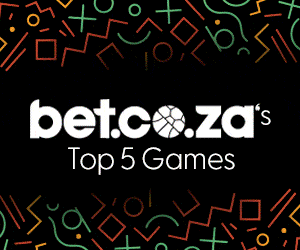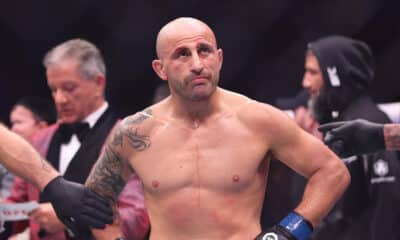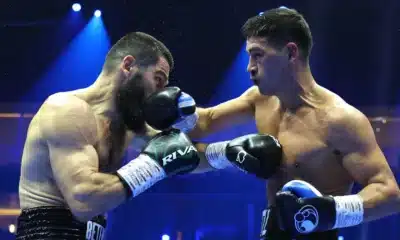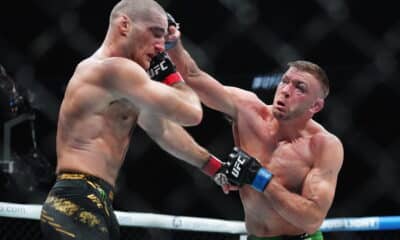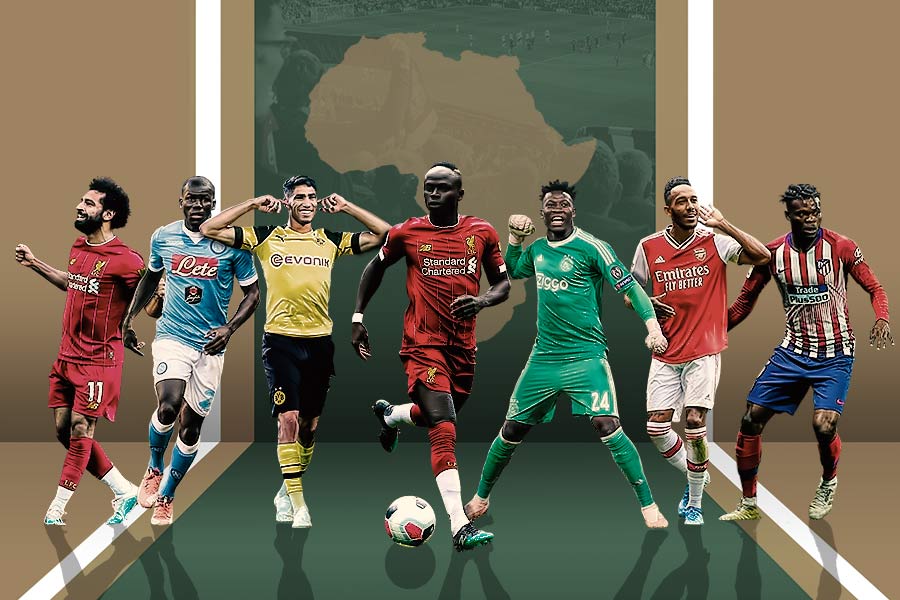
14 October 2019, by: Zach Lowy
The Best Africa XI
Today, more and more African footballers are placed amongst the footballing elite than ever before. But who are the best African players in each position? As tough as it may be to make a combined XI, we’re going to give it a shot.
Bet Central presents the best African XI playing a 4-4-2.
GET ACCESS TO THE BEST CASH OUT IN SA
Extensive pre-match & live in-play cash out across more leagues and tournaments than anywhere else.
Be in total control with more cash out opportunities than anywhere else!
Exclusive to BET.co.za customers.
From Jacques Song’o to Thomas Nkono, Cameroon has always been well-endowed between the sticks, and at 23 years old, Onana is set to continue their proud tradition. Despite being the youngest of the bunch, Onana beat out Carlos Kameni and Fabrice Ondoa for a starting spot in this summer’s African Cup of Nations, keeping a clean sheet in his first three games before conceding three to a red-hot Nigerian attack.
Like Ondoa, who also came through the Samuel Eto’o academy before moving to Barcelona at a young age, Onana bided his time in the youth ranks before leaving (Ondoa at 20, Onana at 18). But whilst Ondoa struggled for playing time at three different Spanish sides after departing La Masia, he settled for a backup role at KV Oostende. While Onana is currently making a name for himself as one of the hottest shot-stoppers in world football.
Following Jasper Cillessen’s sale to Barcelona in the summer of 2016, Ajax, as usual, turned to their in-house replacement in Onana, then 20 years old. Since then, he’s played in a key role in Ajax’s run to the 2017 Europa League Final, as well as their domestic double last season, which nearly saw I Lancieri make it to the Champions League Final.
While he didn’t get a big-money move like ex-teammates Matthijs de Ligt and Frenkie de Jong, if he keeps up this form, it’ll only be a matter of time before a top European side picks the Indomitable Lions’ number one to protect their arc.
Honourable mentions: Denis Onyango (Uganda) and Édouard Mendy (Senegal).
He’s only been playing in Europe for a little over two years but at 23, Atal is already considered one of the most desired right-backs on the market. The only question is, is he really a right-back? Or better used elsewhere?
Like many attack-minded fullbacks, such as Ricardo Pereira and Dani Alves, the Algerian road-runner has been pushed out to the wing by Patrick Vieira, as the Nice manager attempts to mask his defensive flaws and maximize his attacking responsibility.
Atal, who replaced Pereira following his loan return to Porto, has been a revelation since joining Les Aiglons from Algiers-based Paradou Athletic Club (he spent a season on loan in the Belgian first division at Kortrijk prior to the move).
Despite losing key parts of their team such as Alassane Pléa, Mario Balotelli and Jean Michel Seri, Nice managed to scrape together a 7th-place finish thanks in no small part to Atal, whose attacking verve, pace and 1v1 ability worked like a charm in Vieira’s 3-4-3.
Working on the opposite side of Allan Saint-Maximin, Atal would sometimes tuck into the right-back position, whereas left-sided centre back Malang Sarr would shift to left-back, and Dante and Christophe Hérelle making up the rest of the backline. For a Nice side that struggled to fill the lofty shoes of Balotelli and Pléa in attack, Atal was their oxygen.
This season, Atal has played further forward in attack, alongside new arrivals Kasper Dolberg and Alexis Claude-Maurice, with Patrick Burner occupying the right-back spot. He’s struggled to retain the ball as well as previously, but once defensive standout Herelle and Atal’s compatriot Adam Ounas return from injury, once Dolberg and Claude-Maurice fully settle into the rhythm, expect to see Atal return to his top level.
Honourable mentions: Noussair Mazraoui (Morocco) and Ola Aina (Nigeria).
While he’s the only player amongst the starting line-up who is no longer playing for his national team, one would be remiss to ignore Matip’s exceptional 2019. After joining Liverpool on a free transfer from Schalke, Matip’s form, while generally positive, was plagued by brainless errors and the impression that he was too soft to cut it in the Premier League.
However, since being coupled with a genuine world-class defender in Virgil van Dijk, Matip has gone from strength to strength. While the Dutchman gets the credit for shoring up a once-leaky backline, it has been the Cameroonian who has been Liverpool’s best centre back this season. Joe Gomez, widely considered as one of the most promising centre backs in the division, is currently miles away from beating out Matip for the starting spot in Jürgen Klopp’s team.
With Matip out with a slight knock, Gomez filled in for him against Red Bull Salzburg and looked like a deer in the headlights as a typically resolute side leaked three goals. They missed Matip’s characteristic calm on the ball and positional awareness, and so did Van Dijk. Sometimes, you don’t know what you’ve got until it’s gone.
Matip, who played as a defensive midfielder in the 2010 and 2014 World Cups, has gone from an expendable fringe player to a vital part of Liverpool’s success. His vision and precise passing has helped Liverpool break down compact deep blocks, and as Liverpool aim to hold onto their eight-point lead atop the table in a bid for their first Premier League title in club history, they’ll need Matip to keep up his rock-solid form.
Honourable mentions: Djené Dakonam (Togo) and Nicolas Nkoulou (Cameroon).
In truth, this was possibly the easiest choice on the list. We have reached a point where we no longer debate whether or not Koulibaly is the best African defender or the best defender in Italy, but the best defender in Europe. If his heroic performance at the San Paolo against Liverpool last month is anything to go by, he certainly has a legitimate shout.
Koulibaly took care of the dual threat of Roberto Firmino and Mohamed Salah, quickly covering space across his line and giving a masterclass in positioning and marking. Van Dijk, on the other hand, was a rookie in comparison that night.
There’s a reason Napoli owner Aurelio De Laurentiis rejected a £95 million transfer bid from Manchester United last year. Koulibaly, whose release clause stands at €150 million, might eventually be sold as the club look to get a decent return for a player approaching the end of his prime. But for now, at 28, he keeps finding new ways to improve.
After joining from Genk for a fee of £6.5 million, Koulibaly seemed a tad clunky and awkward in his first season under Rafa Benítez. But he emerged as one of the brightest defenders in world football under the tutelage of Maurizio Sarri, and he’s only gotten better under Carlo Ancelotti.
The Senegalese defender is so much more than a rock at the back, though; he’s a role model. In the past year, he’s been a victim of racial abuse from Atalanta and Inter fans, but he’s come out with his head held high, declaring himself “proud” of his “skin colour.” In a society plagued by commonplace racism, one of the biggest voices in Italian football is using his platform to change the game.
Honourable mentions: Willy Boly (Ivory Coast) and Salif Sané (Senegal).
Like Atal, another attack-minded Maghreb fullback, Hakimi should not be pigeon-holed in one position. He’s equally adept playing on the right of a back four as the left, but recently, he’s showcased his talent whilst playing in attack.
Before the international break, he scored three goals in two games, starting both matches on the left-wing of Lucien Favre’s 4-2-3-1, but dropping back to right-back against Freiburg following Łukasz Piszczek’s injury.
The Morocco international was a key performer in Borussia Dortmund’s ultimately futile title challenge last season; like the majority of the side, he excelled in the first half of the season but collapsed after Christmas.
But while there are plenty of defensive frailties he must brush up on, it’s clear as day at Hakimi has the potential to make it at the top level. And his versatility is the cherry on top.
There’s a strong chance Real Madrid could have a new starting right back next season. Following his worrisome heart condition in 2017, Dani Carvajal hasn’t quite recovered the form that made him the best right-back in football for a few seasons. Álvaro Odriozola, on the other hand, hasn’t lived up to the hype either since joining from Real Sociedad for €35 million last year.
It seems likely that Hakimi, who, like Carvajal, progressed his way up through Real Madrid’s academy before leaving on loan to gain playing time in Germany, could be in for a serious first-time role in the Spanish capital once his loan expires next summer.
At 20 years old, he’s already a starter for club and country, having played in the World Cup and the African Cup of Nations over the past two seasons and becoming the first Moroccan player to ever receive a Champions League medal.
A quick, technical player who can burn defences on the counter and also recover in time while defending, he has the potential to mark a decade for the Atlas Lions.
Honourable mentions: Kwadwo Asamoah (Ghana) and Ghislain Konan (Ivory Coast).
What is there to be said about Partey that hasn’t been said already? He’s taken over the leadership role both on and off the pitch following the departure of ex-captain Gabi to Al-Sadd. He’s kept new arrivals Héctor Herrera and Marcos Llorente on the bench with his impeccable form, and he’s been a reference point for an Atlético Madrid side that is in the midst of a rebuild.
Having joined the club as a teenager, Thomas bided his time in the reserves and successive loans to Almería and Mallorca before becoming a regular in the 2017/18 season. He is the talisman, the lynchpin of midfield, and he adds customary defensive solidity and fight to Diego Simeone’s 4-4-2 whilst also offering creativity that few, including Koke, Saúl Ñíguez and Thomas Lemar, fail to replicate.
Watch his performance against Real Madrid last month, and you’ll see what I’m talking about. Against the likes of Toni Kroos, Luka Modrić and James Rodríguez, he was the most creative midfielder at the Wanda Metropolitano, breaking the lines for fun with his laser-guided passing.
The Ghanaian has stepped up in the absence of Rodri, who left for Manchester City after the Premier League champions triggered his €70 million release clause. The Madrid native followed in the footsteps of his French teammates Antoine Griezmann and Lucas Hernández, who left for even higher amounts this summer after Barcelona and Bayern Munich, respectively, triggered their release clauses.
Surprisingly though, nobody triggered Partey’s €50 million release clause, a measly amount given the player’s age and ability. While several English and Italian sides have shown an interest in the Black Stars’ midfield controller, it appears they won’t have the chance for much longer.
Atlético are reportedly set to begin contract negotiations that would double his release clause and significantly raise his salary. Partey is reportedly happy in Madrid and both sides are confident of reaching a deal before Christmas.
You snooze, you lose.
Honourable mentions: Wilfred Ndidi (Nigeria) and Diadie Samassékou
You’d be hard-pressed to find a better spine in Europe or South America than Koulibaly-Gueye-Mané, let alone Africa. Whilst still encountering the same structural problems that troubled them in the 2018 World Cup, it was the individual talent from that spine that saw Senegal march to the 2019 African Cup of Nations, only to lose to Algeria in the final.
After seeing his dream move to Paris Saint-Germain dashed at the last minute in the January transfer window, Gueye didn’t pout or put up a fuss. Instead, he handled business as usual, mustering a standard 8th-place finish for Everton before heading to Egypt for the African Cup of Nations. The Teranga Lions, who scraped together consecutive 1-0 victories against Uganda, Benin, and Tunisia en route to the final.
Gueye mostly gets praised for his nonstop workrate off the ball and his ball-winning attributes, but he’s far more complete than he gets credit for. Senegal needed every bit of his creativity to advance past a tough Benin side in the quarterfinals. For the solitary goal, Gueye drops deep to receive, slides it in for Sadio Mané, sprints forward to latch onto Mané’s one-two, before slamming his shot past Saturnin Allagbé.
Despite the disappointing loss in the final, Gueye eventually got his desired move to PSG. Three years after being relegated with Aston Villa, he’s starting week in week out for the French champions. He’s provided everything that Leandro Paredes, the midfielder that ex sporting director Antero Henrique bought instead of Gueye in January, hasn’t been able to offer.
Every team needs a workhorse who’s willing to cover every blade of grass for them–just look at Inter’s Stefano Sensi and Chelsea’s N’Golo Kanté. But like the aforementioned pair, Gueye offers so much more.
Nearly seven years since his last Champions League performance, Gueye made Toni Kroos’ life a living hell on September 18, as PSG dominated Real Madrid en route to a 3-0 thrashing. Today, PSG have conceded four goals in their first 11 matches this season, or 0.36 goals per match. No team in Europe’s top 5 leagues tops that.
They wouldn’t have that defensive solidity had it not been for a player who didn’t leave Dakar until he was 18, and who didn’t play in Europe’s top 5 leagues until he was 21. Good things come to those who wait.
Honourable mentions: Ibrahim Sangaré (Ivory Coast)) and Geoffrey Kondogbia (Central African Republic).
The creative maestro behind arguably the greatest upset in modern football history, Mahrez tailed off in the 2016/17 season following the departure of N’Golo Kanté and the regression to the mean of a team that, loaded with Champions League football, were dangerously closing in on relegation territory when Claudio Ranieri was sacked.
However, the Algerian began the following season in top form, so much so that Manchester City went in for his services in the January window, a transfer saga that would break down, leaving him despondent, before resurrecting the following summer and finally materializing.
Despite his lengthy list of accolades, Mahrez didn’t take to Pep Guardiola’s new system like a duck to water. Similarly to Bernardo Silva of the season prior, he took a season to adjust before finding his best form, his missed penalty against Liverpool serving as the flashbulb memory from a disappointing 2018/19.
However, when it came to leading Algeria in the 2019 African Cup of Nations, it seemed like the Mahrez of Leicester had returned. Since winning the Premier League with the Foxes, Mahrez had struggled to replicate his form for the Desert Foxes. Algeria bounced out of the AFCON group stage in 2017 and failed to make it to the World Cup in 2018. This time, however, things would change.
Mahrez scored against Kenya and Guinea before breaking Nigerian hearts in the semifinal. He turned the usually reliable Jamilu Collins inside out before his attempted cross bounced of Willam Troost-Ekong for an own goal. And just when it seemed the Super Eagles were set to force extra time, he slotted a disgustingly precise free-kick into the left corner at the buzzer.
After defeating Senegal in the Final, his young compatriot Ismaël Bennacer won the Best Player Award, but it was Mahrez’s creative genius that reigned supreme throughout the tournament.
Honourable mentions: Samuel Chukwuee (Nigeria) and Nicolas Pépé (Ivory Coast).
When Mohamed Salah joined Liverpool in the summer of 2017, many questioned if Mané could replicate the devastating form that had seen Liverpool finish top four on the left flank. Little did they know, though, that the Senegalese winger had produced quality performances on the left flank for Southampton and Red Bull Salzburg, and he’s only gotten better, and today, Liverpool’s front three is widely viewed as the supreme attack in Europe.
Mané is, in many ways, the symbol of this fearsome Liverpool side. Since taking over four years ago, Jürgen Klopp has reached three European Finals, won the Champions League, and nearly won the Premier League title last season.
Today, they’re the only club in Europe’s top 5 leagues that have won each of their league matches (8/8), and their current eight-point lead over defending champions Manchester City is greater than the gap between first and second in the top tiers of Spain, Germany, Netherlands, Italy, France, Russia and Portugal…combined.
When you watch Mané play, it’s a miracle how he’s managed to stay fit despite playing regularly in Klopp’s gegenpressing system for the past four seasons. He is the all-action playmaker, a forward who can lead counterattacks and cut through deep blocks with a deadly through ball, while also tracking back to help Andrew Robertson on defence, getting stuck in to extinguish possible danger, and maintaining Liverpool’s high press with typical vivacity.
It’s no wonder Lionel Messi picked him as the Best Player in the World. He is the lifeblood of this team.
Honourable mentions: Wilfried Zaha (Ivory Coast) and Amine Harit (Morocco).
On paper, Salah plays on the right of Liverpool’s front three, but on the pitch, he almost plays as a centre forward, leading the line with Firmino dropping into a false 9 role. While he hasn’t enjoyed his best start to a season, he’s still chipped in braces against Red Bull Salzburg and Arsenal, a flurry of solo goals, and created a plethora of chances for his teammates.
Then again, perhaps he’s just a victim of the monumental standards he’s created for himself. In his first season back in England following his failed spell at Chelsea, he set a record for most goals scored in a 38-game Premier League season (32), scoring in 24 league matches (another record).
In the run-up to the Champions League Final, he scored against Porto, chipped in braces against Manchester City and Roma, before being forced to withdraw in Kyiv due to a shoulder injury.
The following season, though, it would be Salah who would get the last laugh. While he didn’t hit the same numbers as 2017/18, he did play a titular role in Liverpool’s ultimately futile title challenge and successful Champions League campaign.
Salah slotted in the opening penalty against Tottenham to give Klopp’s side the advantage, and by the end of the game, he lifted his first team trophy since 2014, when he won the Swiss Super League with Basel.
If you think Liverpool are good now, just wait until he hits his stride.
Honourable mentions: Andy Delort (Algeria) and Hakim Ziyech (Morocco).
It’s almost scary to imagine what this Arsenal team would’ve looked like had they signed Aubameyang when Alexis Sánchez was still a Gunner and when Mesut Özil was still in his prime. But while Alexis is currently in Milan by way of Manchester in a desperate attempt to revive his flailing career, and while Özil has struggled to find a way into manager Unai Emery’s plans, Aubameyang has been a godsend.
In fact, out of Arsenal’s three major moves in January 2018 (trading Alexis for Henrik Mkhitaryan, giving Özil a contract worth £350,000 before tax, and replacing Olivier Giroud with Aubameyang) only the latter has clearly proved to be the correct decision.
For a team that had spent so long trying to replace Robin van Persie, Aubameyang has been the clinical goalscorer they’ve been waiting on. He’s Gabon’s all-time leading goalscorer with 25 goals.
He’s finished as the league’s leading scorer for two of the past three seasons–2016/17 (Bundesliga) and 2018/19 (Premier League). Despite leaving in January, Aubameyang finished as Dortmund’s leading scorer in 2017/18 with 21 goals; no other Dortmund player reached double figures.
More than just the goals, though, it’s been his impact on the team. Alexandre Lacazette failed to immediately settle in after joining from Lyon, but after Aubameyang broke Lacazette’s club record fee and joined the ranks, the Frenchman formed a dynamic duo with the Gabon international.
His friendships with the Francophone signings (Lacazette, Mattéo Guendouzi, Nicolas Pépé) have not only helped the new arrivals settle in, but have boosted the team’s morale.
At 30, he shows no signs of slowing down, literally and figuratively. With Lacazette out since the first week of September, he’s picked up the slack, scoring eight goals in all competitions, a mere one goal behind Tammy Abraham and Sergio Agüero in the Premier League Golden Boot race.
With vital goals against Newcastle, Tottenham, Burnley, Manchester United, Watford and Villa, Emery can thank his Gabonese marksman for the fact that his team is currently third in the league, rather than outside the top four.
Honourable mentions: Islam Slimani (Algeria) and Victor Osimhen (Nigeria).
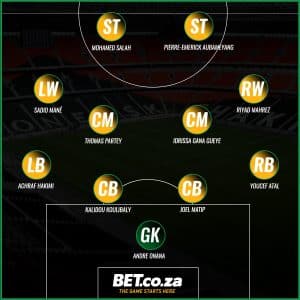
JOIN BET.CO.ZA NOW AND GET 100% DEPOSIT MATCH UP TO R1000
Open your BET.co.za account here
Deposit using your preferred method
Your bonus gets added immediately!
MORE SOCCER













